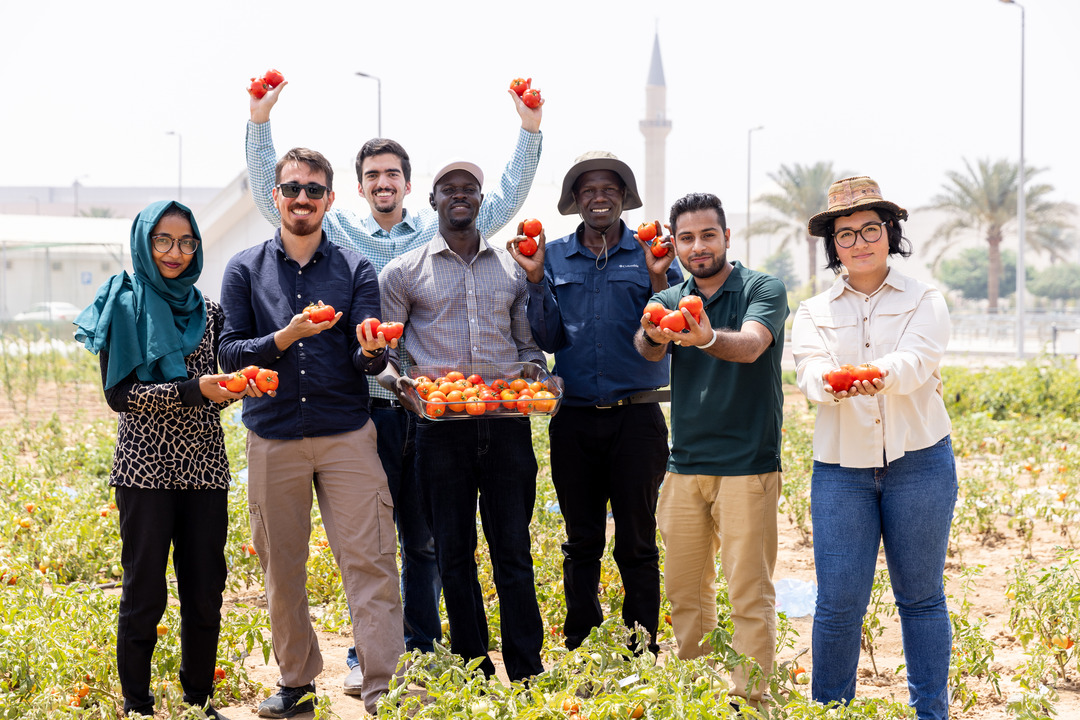Saudi deserts transformed: Terraxy innovations pave path toward green future

Terraxy Company Inc. is playing a key role in the Saudi Green Initiative’s goal to plant 10 billion trees, providing solutions that can transform the Kingdom’s deserts into fertile landscapes. Central to the KAUST startup’s innovations is CarboSoil — an advanced form of the durable soil-amendment biochar, whose origins date back thousands of years.
“Through CarboSoil, we’re not just giving soil a nutrient boost, we’re building soils that will last for centuries,” said Adair Gallo Jr., co-founder and chief executive officer. He added that biochar research started around 20 years ago as scientists began probing “terra preta” (black earth) in the Amazon Rainforest.
These ancient soils, located in specific regions of the rainforest, were dark, fertile and [manufactured]. The soils’ organic matter was ultra-stable, which is how researchers started realizing the effects of biochar.”
Researchers are actively investigating the potential of biochar to enhance soil organic carbon, improve fertilizer-use efficiency, and aid in soil remediation, noted Gallo. In parallel, entrepreneurs are pushing to reduce biochar’s price point for market entrance. For Saudi Arabia, though, conventionally created biochar typically will not work due to the alkaline nature of sandy soils.
Raw biochar has a high pH of about 11, making it effective for neutralizing acidic soils, he said. However, Saudi soils already possess a pH of roughly 8.5, meaning applying untreated biochar would raise the pH far beyond desirable levels. Biochar must be treated prior to in-Kingdom use. “Our product furnishes the beneficial effects of biochar while arresting the harmful ones. We are selling it under the brand name ‘CarboSoil’ to differentiate it from any biochar.”
Along with its SandX solution, Terraxy’s CarboSoil promotes afforestation and sustainable land restoration that can combat desertification throughout the Arabian Peninsula and beyond, Gallo added. “Our patented technologies improve soil fertility, conserve water and enhance plant growth, demonstrating KAUST’s positive impact globally.”
Reusing chicken waste
Saudi Arabia’s poultry industry disposes of more than 400 kilotons of manure in landfills each year, presenting a significant opportunity to repurpose this waste. According to Gallo, converting the manure into CarboSoil could be a game changer for desert rehabilitation, supporting greening efforts, food production and landscaping initiatives.
Over the years, Terraxy has demonstrated the potential of CarboSoil through field trials with industrial partners such as Saudi Aramco’s Green Energy and Environmental Policy and NEOM’s Nature Conservation Sector, servicing more than 60,000 native plants.
Gallo said field trials show Terraxy’s product achieves similar initial results to peat moss, which is the “gold standard” in soil-amendment quality but is also carbon-emitting, but CarboSoil after-effects last for much longer.
Most recently, the company executed a 1.3-hectare native tree research plantation at Wadi Qadid National Park — a collaborative project between KAUST and the National Center for Vegetation Cover and Combatting Desertification (NCVC). Site experiments will evaluate how varying irrigation and soil-amendment treatments affect the growth and establishment of five native tree species, offering key insights for revegetation efforts under the Saudi Green Initiative.
“One thing we always try to communicate is the difference between CarboSoil, compost and peat moss,” Gallo said, adding CarboSoil is incredibly stable in the soil. “It stays in soil, binds with nutrients and, therefore, provides long-term benefits. That’s not something you get with traditional soil enhancers such as peat moss or compost, which decompose within a year and release carbon into the atmosphere. The hotter the area, the faster the decomposition.”
At a 50-ton-per-hectare application rate, CarboSoil boosts water and nutrient retention in sandy soils by 11 and 53 percent, respectively. With 73 percent of CarboSoil expected to remain intact after 100 years, Gallo sees the product’s long-term merit as clear and compelling. “Its value as a soil enhancer in the region dwarfs the associated carbon credits. So, Terraxy need not depend on them for now.”
A heated process
To make CarboSoil, Terraxy carbonizes poultry manure by shredding it and loading it into a furnace, heating it in the absence of oxygen. This process, known as “pyrolysis,” brings the material to above 500 C, which converts it into biochar. Terraxy further treats the material to create CarboSoil.
This process also produces flammable synthetic gas — a mixture of hydrogen and hydrocarbons. Terraxy has demonstrated this syngas can power the system, meaning external energy is not needed for continuous pyrolysis.
In 2023-24, Terraxy piloted the full process at a scale of one ton per day, producing more than 150 tons of CarboSoil, 120 tons of syngas and preventing 400 tons of chicken manure from ending up in landfills. “The technology is ready, and we are gearing up for an industrial scale-up,” Gallo said.
While CarboSoil improves soil chemistry and nutrient bioavailability, water scarcity remains a regional concern. That is where Terraxy’s pioneering mulching solution, SandX, comes into play.
Gallo said this innovation reduces water evaporation from topsoil by up to 80 percent, significantly enhancing soil moisture, which boosts seedling survival and plant health. The CEO views these two technologies as complementary, offering a comprehensive, carbon-negative solution to enhance soil and plant vitality across the Middle East.
“By transforming waste into a resource, we’re not only improving soil health but also contributing to a sustainable future for our deserts. CarboSoil and SandX are more than just products. They’re a vision for a greener Saudi Arabia.”

